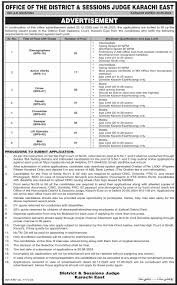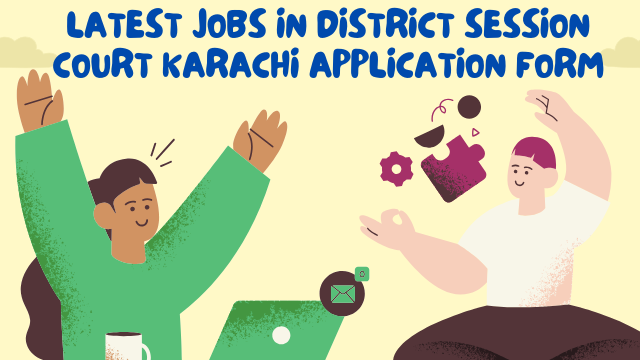The latest jobs have been announced by the District Session Court Karachi, which was advertised in the Dawn newspaper on May 26, 2025. If you are interested in the jobs of the District Session Court, then you have come to the right place. Here you will get complete information about the jobs of the District Session Court Karachi.
These jobs of District Sessions Court Karachi will be on the basis of merit. Any candidate who meets the merit will be able to get the jobs. These jobs in Pakistan in 2025 are for both men and women.All those believers who belong to Sindh province can apply and are eligible for these jobs.
Before applying online for District Station Court Karachi jobs, understand them well and then apply. Otherwise, your application form may be rejected. I am saying it again. Read, understand and then apply. Read the information given below correctly and then apply.
Details of District Session Court Karachi Jobs
| Post Date | 26-05-2025 |
| Industry | Government |
| Hiring Organization | Government of Pakistan, Karachi |
| Jobs Location | Pakistan |
| Last Date | 25-06-2025 |
| Education Require | Relevant Qualification |
| No of Posts | 125+ |
| Employment Type | Full Time |
| News Papers | DAWN newspaper |
| Address | Karachi, Sindh Pakistan |
Jobs Description of District Session Court Karachi Jobs
The District and Session Court Karachi West has officially announced new job vacancies for 2025, inviting competent, qualified, and eligible individuals to apply for various posts. These government positions offer long-term career growth, job stability, and an opportunity to serve the judicial sector of Pakistan with dignity and commitment.
Available Posts & with Details of District Session Court Karachi Jobs
| Post Name | BPS | No. of Vacancies | Required Qualification | Age Limit |
|---|---|---|---|---|
| Stenographer | 16 | Multiple | Intermediate + Shorthand/Typing | 18 – 28 Years |
| Junior Clerk | 11 | Multiple | Matric + Typing Speed (30 wpm) | 18 – 28 Years |
| Naib Qasid | 03 | Few | Primary | 18 – 28 Years |
| Chowkidar | 03 | Few | Primary | 18 – 28 Years |
| Mali | 03 | Few | Gardening Skills Required | 18 – 28 Years |
| Sweeper (Sanitary Worker) | 03 | Few | Physically Fit | 18 – 28 Years |
All appointments will be made under the Government of Sindh recruitment policy and based on merit and domicile/residency criteria.
How to Apply for District Session Court Karachi Jobs
Step-by-Step Application Process:
- Download Application Form:
Obtain the official application form from the Karachi West District Court or their authorized recruitment portal. - Attach Required Documents:
- CNIC Copy
- Domicile and PRC
- Educational Certificates
- Two Recent Passport Size Photographs
- Experience Certificates (if any)
- Submit via Courier or In-Person:
Submit the complete application to the Office of District and Session Judge Karachi West before the deadline. - Deadline:
Applications must be submitted on or before the specified date in the job advertisement.
Eligible Criteria for District Session Court Karachi Jobs 2025
✅ Domicile Requirement
- Candidates must hold domicile of Karachi West District.
- PRC (Permanent Residence Certificate) Form-D is mandatory.
✅ Educational Qualification
- Minimum Primary education for lower-grade posts.
- Intermediate required for Stenographers with speed of 80/40 wpm in shorthand and typing.
- Matriculation with 30 wpm typing speed required for Junior Clerks.
✅ Typing & Computer Skills
- Candidates applying for Stenographer and Junior Clerk must possess good command over MS Office and typing tests.
Advertisement of District Session Court Karachi Jobs 2025

Online Apply for District Session Court Karachi Jobs
The procedure for applying online for District Sessions Court Karachi jobs is that you will go to the official website of the District Station Court, go there and press the button in the section you are interested in, then all the available jobs will be displayed as shown in the image below, this is what you have to do.

Open the application form, fill it after downloading the application form and then send it to the District Sessions Court Karachi. If you still do not understand anything, then contact me. Insha Allah, your problem will be solved. Whatever happens, you can also comment on the jobs. I will definitely
About District Session Court Karachi
Karachi, Pakistan’s largest and most dynamic city, relies heavily on a robust judicial system to maintain law and order. At the heart of this system is the District Session Court Karachi, a pivotal institution responsible for delivering justice across a wide range of legal matters. Whether it’s handling civil disputes, criminal trials, or family conflicts, this court plays an essential role in upholding justice in one of the most populous districts of Pakistan.
Historical Background
Origin and Establishment
The District Session Court Karachi traces its roots back to the early days of Pakistan’s judicial setup. Established soon after independence, it was modeled on the British colonial judicial framework. Over the decades, it has evolved with changing legal reforms, growing urban populations, and increasing caseloads.
Evolution Over Time
From simple courtrooms with basic legal proceedings to a complex web of legal practices and technology-driven case management, the court has seen tremendous growth. Its evolution reflects Karachi’s own transformation from a port town to a sprawling metropolitan hub.
Jurisdiction and Authority
Territorial Jurisdiction
The District Session Court Karachi holds jurisdiction over multiple towns and neighborhoods within the Karachi division. This includes areas like South Karachi, East Karachi, Central Karachi, and others.
Legal Powers and Scope
Being a court of first instance, the Sessions Court holds the authority to try serious criminal offenses such as murder, robbery, kidnapping, and major fraud cases. It also handles appeals against decisions made by lower courts.
Types of Cases Handled
Civil Cases
Civil cases include disputes related to property, contracts, tenancy, inheritance, and torts. These cases are typically complex and often involve multiple hearings.
Criminal Cases
This is where the court shines. Criminal trials such as homicide, armed robbery, and rape cases are tried under the jurisdiction of the Sessions Judge. The court also grants bail and remand orders.
Family and Juvenile Cases
Special sections within the court are dedicated to handling family disputes, child custody, and juvenile delinquency, ensuring sensitivity and speed in these matters.
Subordinate Courts and Hierarchy
Civil Judges and Magistrates
Working under the Sessions Court are numerous civil judges and judicial magistrates who handle minor civil and criminal matters.
Relationship with High Court of Sindh
The court operates under the supervision of the Sindh High Court, which ensures procedural integrity and oversight. Appeals against the decisions of the District Court can be made to the High Court.
Structure and Administration
Courtroom Setup
The District Court complex comprises multiple courtrooms, chambers, a record room, legal aid centers, and a bar room. Each courtroom is equipped with basic legal infrastructure and is presided over by a judge.
Key Administrative Departments
These include the case filing office, clerical section, process-serving section, and security management units. They ensure smooth day-to-day functioning.
Key Personnel
District and Sessions Judge
The top authority in the court is the District and Sessions Judge, who not only tries high-profile cases but also oversees the court’s administrative operations.
Additional Sessions Judges
These judges assist the District Judge in handling the workload and often specialize in particular types of cases such as narcotics, anti-terrorism, or corruption.
Clerical and Support Staff
Behind every courtroom is a team of clerks, stenographers, record keepers, and bailiffs that help in documentation and enforcement.
Case Management System
Filing Procedure
Cases can be filed through the court’s filing branch. Plaintiffs must submit a plaint, evidence, and relevant documents, which are then reviewed for admissibility.
Case Tracking and Monitoring
Thanks to digital registers and court management software, litigants can now track case progress online or via dedicated help desks.
Notable Cases and Decisions
Karachi’s Session Court has seen its fair share of headline-grabbing cases involving political leaders, business magnates, and social activists. Some judgments have set judicial precedents in areas like women’s rights, terrorism, and human trafficking.
Role in Justice Delivery
Speedy Justice Mechanisms
To curb case backlog and delays, the court implements fast-track hearings for sensitive matters, especially involving minors and women.
Importance in Criminal Justice System
It acts as the primary battleground for serious criminal litigation, ensuring justice is served without fear or favor.
Accessibility and Public Service
Legal Aid and Public Help Desks
To aid those who cannot afford lawyers, the court has legal aid desks providing free consultation and representation.
Facilities for Litigants
The premises have waiting areas, clean drinking water, separate toilets for men and women, and prayer areas, improving the overall experience.
Digital Transformation
Online Services and e-Court Integration
The court is moving towards a paperless future. Filing, notices, summons, and even preliminary hearings can now be managed through the e-court system in collaboration with the Sindh High Court.
Technology in Judicial Practices
Judges now use digital dictation tools, e-case diaries, and video conferencing to manage cases more effectively.
Challenges and Limitations
Case Backlogs
Despite best efforts, the court faces a heavy backlog of cases, a problem common across Pakistan’s judiciary.
Infrastructure Issues
Inadequate facilities, insufficient staffing, and aging infrastructure often hamper the speed and quality of justice.
Recent Developments
Modernization Efforts
With support from law reform commissions and international bodies, the court is upgrading facilities, including better IT equipment and training programs.
Training and Capacity Building
Judges and staff now undergo regular training sessions to stay updated with modern judicial practices and legal reforms.
Future Prospects
Plans for Judicial Reforms
There’s an ongoing push for simplifying procedures, enhancing transparency, and cutting red tape in the judicial process.
Vision for a Transparent Judiciary
The ultimate goal is a corruption-free, transparent, and citizen-centric judiciary, where every person gets equal access to justice.

